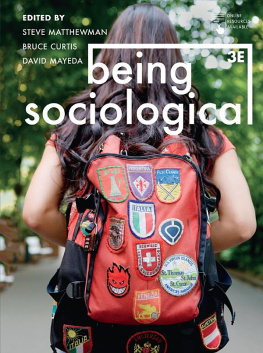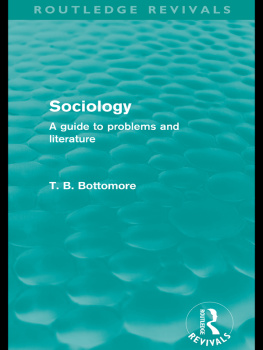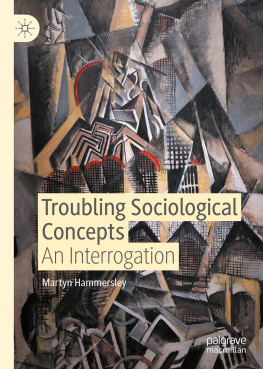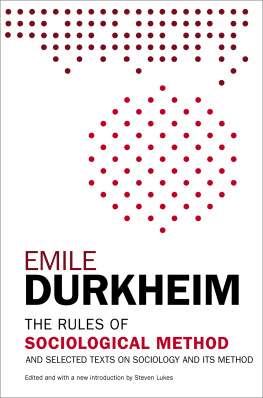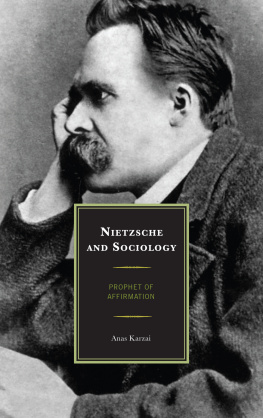SOCIOLOGICAL SOCIAL WORK
This book is dedicated to Brad
Priscilla Dunk-West
Dedicated to Pauline Verity
Fiona Verity
Sociological Social Work
PRISCILLA DUNK-WEST
The University of South Australia, Australia
FIONA VERITY
Flinders University, Australia
First published 2013 by Ashgate Publishing
Published 2016 by Routledge
2 Park Squre, Milton Park, Abingdon, Oxon OX14 4RN
711 Third Avenue, New York, NY 10017, USA
Routledge is an imprint of the Taylor & Francis Group, an informa business
Copyright Priscilla Dunk-West and Fiona Verity 2013
Priscilla Dunk-West and Fiona Verity have asserted their right under the Copyright, Designs and Patents Act, 1988, to be identified as the authors of this work.
All rights reserved. No part of this book may be reprinted or reproduced or utilised in any form or by any electronic, mechanical, or other means, now known or hereafter invented, including photocopying and recording, or in any information storage or retrieval system, without permission in writing from the publishers.
Notice:
Product or corporate names may be trademarks or registered trademarks, and are used only for identification and explanation without intent to infringe.
British Library Cataloguing in Publication Data
A catalogue record for this book is available from the British Library
The Library of Congress has cataloged the printed edition as follows:
Dunk-West, Priscilla.
Sociological social work / by Priscilla Dunk-West and Fiona Verity.
pages cm
Includes bibliographical references and index.
ISBN 978-1-4094-4507-4 (hardback)
1. Sociology. 2. Social service. 3. Social service--Practice.
I. Verity, Fiona. II. Title.
HV40.D824 2014
361.3--dc23
2013029930
ISBN 9781409445074 (hbk)
Contents
List of Figures and Tables
Figure
Table
Notes on the Authors
Priscilla Dunk-West is a sociologist and registered social worker. Her scholarship is concerned with identity/selfhood, professional selfhood and self-making. She researches in the area of selfhood, sexuality and gender and professional self-constitution. Over the past 13 years she has divided her time between Australia and England where she has worked both in social work practice and in academia. She is currently senior lecturer in social work and academic head of field education at The University of South Australia. In 2011 she co-edited, along with Trish Hafford-Letchfield, Sexuality and Sexual Identities in Social Work: Research and Reflections from Women in the Field, published by Ashgate. Her latest book How to be a Social Worker: A Critical Guide for Students uses an interactionist notion of self to understand professional self-making in social work.
Fiona Verity is adjunct Professor of Social Work, Flinders University, South Australia and both a social worker and sociologist. Before academic life she worked for 17 years in community development and management roles, mainly in the community health sector. She has maintained an active engagement in working with community organisations. She has conducted research on the impacts of insurance and risk management on civil society after the collapse of the insurance company HIH, food affordability and access, and community based health promotion. Her recent post was Dean, School of Social and Policy Studies, Flinders University. With Joy Noble, she is the author of a little book calledImagine If: A Handbook for Activists , published by Wakefield Press.
Foreword
There are many pioneers whose work sits at the interface between social work and sociology and yet there is a paucity of this tradition in literature. Although researchers and educators in social work may adopt a sociological position in understanding social work areas of practice and ways, there are few words in social work lexicon which can be used to describe this. If practitioners are using sociology in their practice, as we did in our respective practice, there was and is a lack of a named theoretical tradition to describe this. Sociological Social Work is our contribution towards introducing a type of practice and orientation to the world which is evidenced through theory and research. In this book we make the case that there is no better time to adopt a sociological kaleidoscope in viewing and understanding the world within which we live and work. In this way, Sociological Social Work is as much for researchers and social work educators as it is for practitioners and students.
If there is a positive from the technical/rational (Lupton 1997) world of the professional, it is that it pushes social workers to be clearer about their theoretical orientation and the type of research they draw upon in framing their practice. Our hope is that in response to the question: what theory underpins your practice?, the answer is I was using a sociological social work approach. Our hope is that there is a return to the prominence of the social in social work and that sociological social work opens up a rich new world to researchers, practitioners, students and academics alike.
We write as social workers who have practiced in advanced industrialised contexts Australia and the United Kingdom where social work is part of the tradition of both the welfare state and the non-government sector, and where there have been significant debates, and often quite rehearsed, about social works purpose and ideological underpinnings. We write as social workers committed to social justice, which affects the ways in which we make sense of the world and what we hope for social work. Our narratives are derived from our own experience in research, practice and teaching and yet we are mindful that these representations speak to particular types of social work. We argue that it is important to understand individuals and society through thinking about the interplay of social units and the global. We hope that Sociological Social Work will be seen as the continuation of a conversation that has been present since the origins of social work: one that can continue and alter, shift and respond to our new world and its related challenges, including interpreting past practices, as well as imagining into the future.
Priscilla Dunk-West and Fiona Verity
May 2013
Acknowledgements
This book was developed over a number of years and we are grateful to Claire Jarvis from Ashgate, both for her initial enthusiasm as well as her continued dedication to this project. We have had institutional support from each of our academic institutions, both Flinders University and The University of South Australia, in the writing of this book. We acknowledge the support of Georgia Allan for her editing work.
from the Productivity Commission 2010, Contribution of the Not-for-Profit Sector, Research Report, Canberra Commonwealth of Australia, Productivity Commission is reproduced by permission.
There is much to be said for the occupation of the space between disciplines: this book is as much a contribution to this terrain as it is a bridge between sociology and social work. We acknowledge the historical legacy of the connections between sociological theory and social work practice and the development of the contextualisation of the individual within their social and interpersonal contexts. We hope that our small contribution to such a perspective offers new potential for the building of research, theory and practice and a more clearly articulated sociological social work. We have been thankful that in this project we have been, to boldly quote Isaac Newton, standing on the shoulders of giants of those who have developed sociology in social work.


